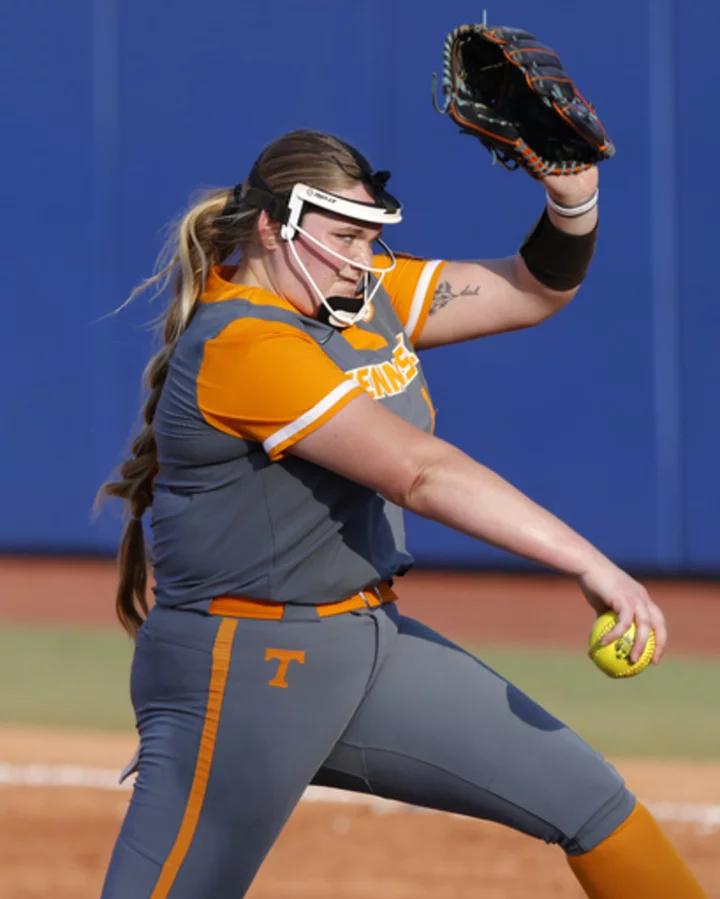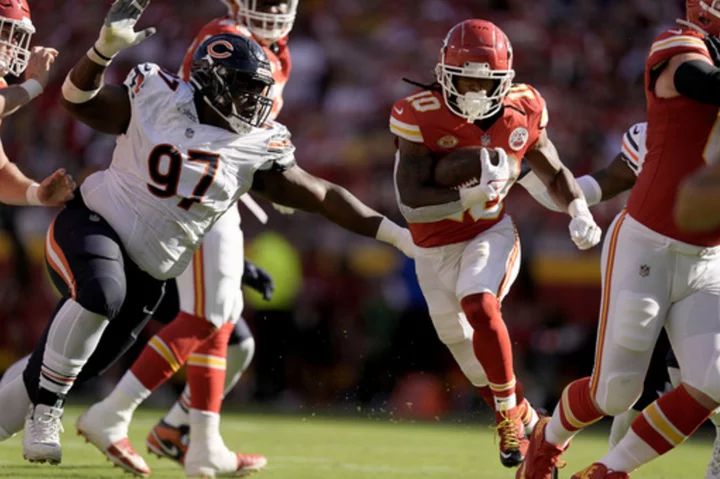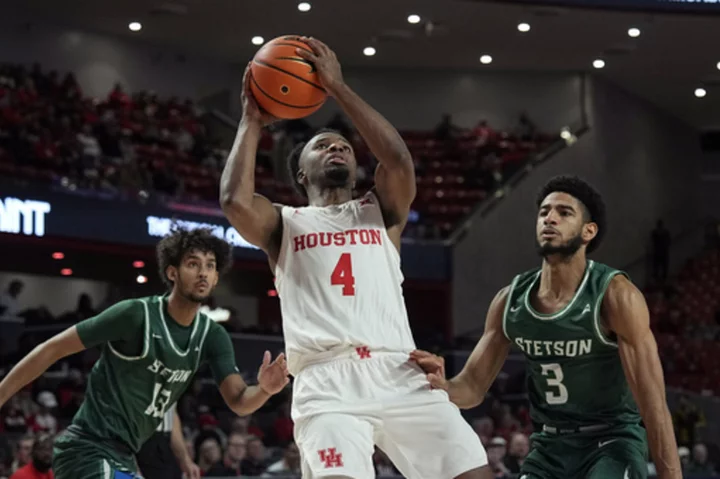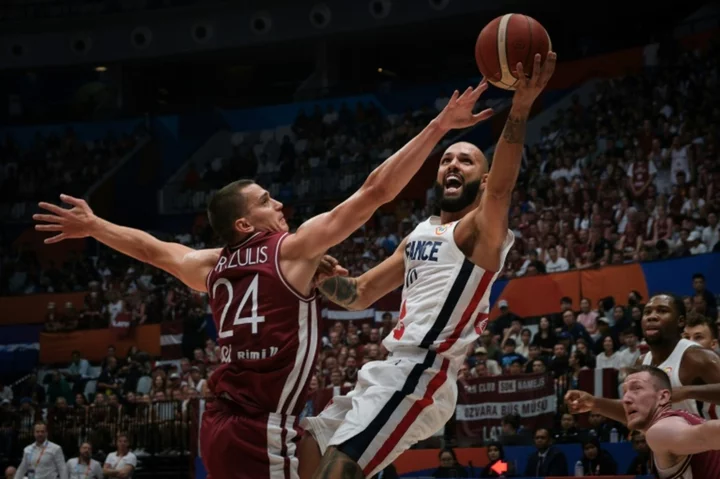USA’s dominant era ends on a night of chaos, confusion and heartbreak
Views: 4249
2023-08-06 21:18
The United States got the result that was coming, but in a manner that no one could have predicted. The USA’s reign of dominance at the Women’s World Cup is over; after two consecutive titles and four overall, they suffered their earliest-ever exit from the competition at the hands of a familiar opponent. After victories over the USA at the previous two Olympics, Sweden struck again. This time it was by the finest of margins, with Lina Hurtig’s winning penalty crossing the line by barely an inch, awarded by VAR amid confusion, madness and heartbreak. It brought one of the most successful eras in sport to a close. The USA set the standard and led the way at the Women’s World Cup, but now the rest of the world has caught up. Megan Rapinoe could only laugh, and then cry, as her penalty was blazed over the bar. Player of the tournament in 2019 and a winner in 2015, her final touch at her final World Cup in 2023 was an ignominious one. Kelley O’Hara, another stalwart of the USA’s golden age, also missed at a crucial moment, setting up Hurtig’s final blow. The USA will now turn to a new generation, but this defeat will leave its mark. Sophia Smith, the next star of the USA team, missed the chance to send the defending champions through to the quarter-finals, firing high and wide. That could have been her moment, instead it could also spell the end for Vlatko Andonovski. The head coach faced an arduous task in following the two-time World Cup winner Jill Ellis, but he has now resided over the USA’s worst ever campaign at the tournament. His substitutions, or lack of them, against Sweden contributed to their undoing. But defeat, although perhaps not like this, always felt inevitable. It could have come even earlier. After scraping past Portugal in the group stages, the writing felt on the wall. Yet the USA were improved against Sweden. Had it not been for an outstanding performance from goalkeeper Zecira Muscovic, then the USA may have survived long enough to face former foes Japan in the quarter-finals. Muscovic was sublime, another goalkeeper to win player of the match at this World Cup, yet the ironic twist was Sweden won the shoot-out without her needing to make a save. A painful exit at least offers the USA a chance to start again. How they needed it, with a squad that looked trapped between sending out the old generation in a blaze of glory and bringing in the new. The problem for the USA as it attempts to build its next great team is that they are no longer the powerful force in women’s football. The past four years has seen the stunning rise of the European club game and its league, powering England and Spain to new heights, while the past two weeks at the World Cup has demonstrated how other countries around the world have been lifted up by advances in coaching and player development. The USA are no longer at the forefront of that change: the best players in the world are being born in countries like Colombia, and are being nurtured at the powerhouses in Europe. This will be a wake-up call not just for the USA but their entire structure, from its domestic league to its youth development. There was plenty of evidence at this World Cup that the USA’s next line of talent aren’t at the level of previous generations. The USA may have been hit by injuries ahead of the tournament, and were certainly held back by Andonovski’s stale tactics, but none of Smith, Alyssa Thompson or Trinity Rodman lived up to the expectations, especially when compared to the young talent elsewhere at the World Cup. The USA again played a front three that showed little cohesion, a collection of straight lines that failed to connect. There was Rodman, and then Lynn Williams, charging down the right wing, unable to find the crosses. Alex Morgan herself starved of service and confidence, struggling to find the space to make an impact, or the finishing to make her chances count. Smith represents another disjointed fragment, who would surely be starting through the middle if not for Morgan’s history at the World Cup. There was very little change from the bench: Andonovski’s side were more competitive in midfield against Sweden, but failed to find an extra gear when they were clearly on top. The problem for the USA was everyone wanted to be the match-winner: Rapinoe, looking to take a thrown in quickly at the halfway line after coming on as a substitute in extra time, instead launching the ball downfield to where she should have been standing. A different USA side, perhaps of four years ago, wouldn’t have allowed this to reach its dramatic but wildly unpredictable conclusion. It’s been a brilliant World Cup, but this wasn’t a classic, at least in terms of attacking plan. Instead, it was a classic of a different genre, that of a tense and nervy knockout stage clash. Sweden were passive: they had an opportunity to trouble the USA, given the noise around the build-up to the fixture, but ceded control. Sweden played for moments from set-pieces, as if feeding off scraps. The inswinging deliveries from Joanna Andersson targeted USA goalkeeper Alyssa Naeher and a packed six-yard box. Naeher at least dealt with the threat, punching and swinging to clear the danger; Sweden offered little else. For the first time in three games, the USA had the brighter moments: Smith struck at Muscovic after finding space on the right, with Rodman also able to create some moments of danger when roaming inside. Lindsey Horan, goalscorer against Vietnam and the Netherlands, hit the crossbar with a header on the half-hour, the USA almost using Sweden’s strength against them. Horan threatened again in the second half, curling a first-time shot that beckoned the far corner before Muscovic made an excellent diving stop to her left. The contest was destined for extra-time from as early as the first half - it took until the 85th minute for Sweden to have their first shot on target - but much of that was also down to the outstanding Muscovic. The goalkeeper kept Sweden alive with her best save of the match, denying Morgan’s late header when the USA striker seemed set for her moment of the World Cup. Instead, after she was spurned again by Muscovic with a snap-shot, Morgan soon departed. A joint-winner of the Golden Boot in 2019, Morgan left goalless at the World Cup in 2023. Morgan could only watch on at what happened next, powerless to stop what in the end was the inevitable. This was a World Cup too far, for a team who need a new plan. Read More From Megan Rapinoe’s miss to VAR drama: How the USA and Sweden’s penalty shoot-out unfolded Women’s World Cup TV schedule: How to watch every match today Sarina Wiegman reveals stunning Keira Walsh fitness update on eve of Nigeria clash Women’s World Cup golden boot: Who’s leading the top-scorer standings? South Africa exit the Women’s World Cup having left their mark When do England play next? Women’s World Cup fixtures and route to the final
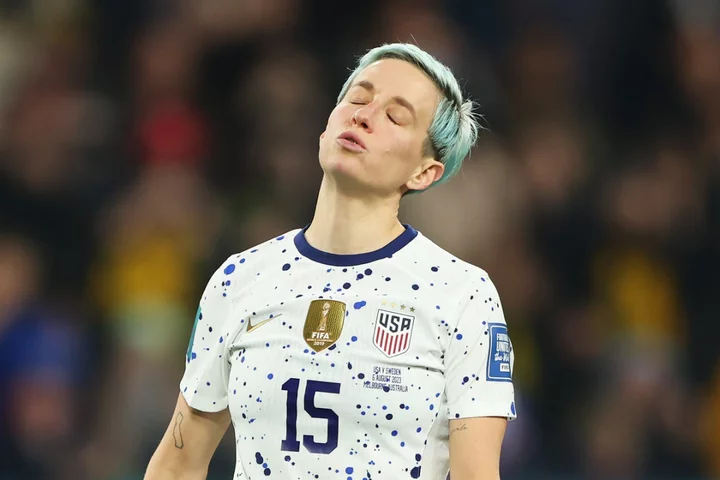
The United States got the result that was coming, but in a manner that no one could have predicted. The USA’s reign of dominance at the Women’s World Cup is over; after two consecutive titles and four overall, they suffered their earliest-ever exit from the competition at the hands of a familiar opponent. After victories over the USA at the previous two Olympics, Sweden struck again. This time it was by the finest of margins, with Lina Hurtig’s winning penalty crossing the line by barely an inch, awarded by VAR amid confusion, madness and heartbreak.
It brought one of the most successful eras in sport to a close. The USA set the standard and led the way at the Women’s World Cup, but now the rest of the world has caught up. Megan Rapinoe could only laugh, and then cry, as her penalty was blazed over the bar. Player of the tournament in 2019 and a winner in 2015, her final touch at her final World Cup in 2023 was an ignominious one. Kelley O’Hara, another stalwart of the USA’s golden age, also missed at a crucial moment, setting up Hurtig’s final blow.
The USA will now turn to a new generation, but this defeat will leave its mark. Sophia Smith, the next star of the USA team, missed the chance to send the defending champions through to the quarter-finals, firing high and wide. That could have been her moment, instead it could also spell the end for Vlatko Andonovski. The head coach faced an arduous task in following the two-time World Cup winner Jill Ellis, but he has now resided over the USA’s worst ever campaign at the tournament. His substitutions, or lack of them, against Sweden contributed to their undoing.
But defeat, although perhaps not like this, always felt inevitable. It could have come even earlier. After scraping past Portugal in the group stages, the writing felt on the wall. Yet the USA were improved against Sweden. Had it not been for an outstanding performance from goalkeeper Zecira Muscovic, then the USA may have survived long enough to face former foes Japan in the quarter-finals. Muscovic was sublime, another goalkeeper to win player of the match at this World Cup, yet the ironic twist was Sweden won the shoot-out without her needing to make a save.
A painful exit at least offers the USA a chance to start again. How they needed it, with a squad that looked trapped between sending out the old generation in a blaze of glory and bringing in the new. The problem for the USA as it attempts to build its next great team is that they are no longer the powerful force in women’s football. The past four years has seen the stunning rise of the European club game and its league, powering England and Spain to new heights, while the past two weeks at the World Cup has demonstrated how other countries around the world have been lifted up by advances in coaching and player development.
The USA are no longer at the forefront of that change: the best players in the world are being born in countries like Colombia, and are being nurtured at the powerhouses in Europe. This will be a wake-up call not just for the USA but their entire structure, from its domestic league to its youth development. There was plenty of evidence at this World Cup that the USA’s next line of talent aren’t at the level of previous generations. The USA may have been hit by injuries ahead of the tournament, and were certainly held back by Andonovski’s stale tactics, but none of Smith, Alyssa Thompson or Trinity Rodman lived up to the expectations, especially when compared to the young talent elsewhere at the World Cup.
The USA again played a front three that showed little cohesion, a collection of straight lines that failed to connect. There was Rodman, and then Lynn Williams, charging down the right wing, unable to find the crosses. Alex Morgan herself starved of service and confidence, struggling to find the space to make an impact, or the finishing to make her chances count. Smith represents another disjointed fragment, who would surely be starting through the middle if not for Morgan’s history at the World Cup.
There was very little change from the bench: Andonovski’s side were more competitive in midfield against Sweden, but failed to find an extra gear when they were clearly on top. The problem for the USA was everyone wanted to be the match-winner: Rapinoe, looking to take a thrown in quickly at the halfway line after coming on as a substitute in extra time, instead launching the ball downfield to where she should have been standing.
A different USA side, perhaps of four years ago, wouldn’t have allowed this to reach its dramatic but wildly unpredictable conclusion. It’s been a brilliant World Cup, but this wasn’t a classic, at least in terms of attacking plan. Instead, it was a classic of a different genre, that of a tense and nervy knockout stage clash.
Sweden were passive: they had an opportunity to trouble the USA, given the noise around the build-up to the fixture, but ceded control. Sweden played for moments from set-pieces, as if feeding off scraps. The inswinging deliveries from Joanna Andersson targeted USA goalkeeper Alyssa Naeher and a packed six-yard box. Naeher at least dealt with the threat, punching and swinging to clear the danger; Sweden offered little else.
For the first time in three games, the USA had the brighter moments: Smith struck at Muscovic after finding space on the right, with Rodman also able to create some moments of danger when roaming inside. Lindsey Horan, goalscorer against Vietnam and the Netherlands, hit the crossbar with a header on the half-hour, the USA almost using Sweden’s strength against them. Horan threatened again in the second half, curling a first-time shot that beckoned the far corner before Muscovic made an excellent diving stop to her left.
The contest was destined for extra-time from as early as the first half - it took until the 85th minute for Sweden to have their first shot on target - but much of that was also down to the outstanding Muscovic. The goalkeeper kept Sweden alive with her best save of the match, denying Morgan’s late header when the USA striker seemed set for her moment of the World Cup. Instead, after she was spurned again by Muscovic with a snap-shot, Morgan soon departed. A joint-winner of the Golden Boot in 2019, Morgan left goalless at the World Cup in 2023.
Morgan could only watch on at what happened next, powerless to stop what in the end was the inevitable. This was a World Cup too far, for a team who need a new plan.
Read More
From Megan Rapinoe’s miss to VAR drama: How the USA and Sweden’s penalty shoot-out unfolded
Women’s World Cup TV schedule: How to watch every match today
Sarina Wiegman reveals stunning Keira Walsh fitness update on eve of Nigeria clash
Women’s World Cup golden boot: Who’s leading the top-scorer standings?
South Africa exit the Women’s World Cup having left their mark
When do England play next? Women’s World Cup fixtures and route to the final


